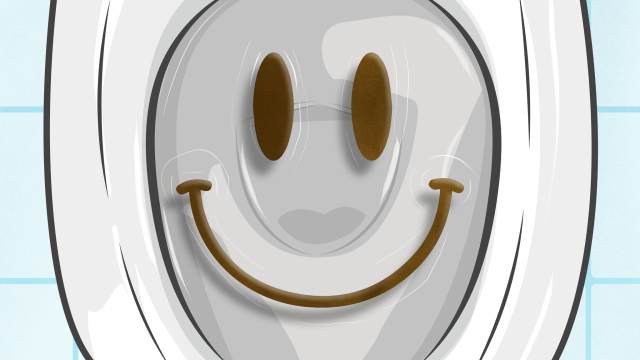How’s your poop? Is it the right colour? How about frequency — are you doing it once a day, regularly? Don’t bother answering (and especially not in the comments, please). The truth is, odds are whatever your answers, you’re doing just fine.
Illustration by Sam Woolley. Photo of weather stone by Tom Knapp.
It’s natural to be curious about your poop. We make a lot of it, after all. Each day might bring different colours, shapes and textures, and it makes you wonder, what’s going on in there?
Most of the time, the daily changes come from ordinary kinds of things: You ate something with a lot of food colouring in it, say, or you ate more or less fibre than you usually do. Maybe you’re experiencing something toward the diarrhoea end of the spectrum because you’re coming down with a virus, or because you’re on medication, like many antibiotics, that has diarrhoea as a side effect.
None of this is major news. In these common cases, your toilet is not acting as a beacon of health. It’s more like those weather forecasting rocks at tourist attractions that only tell you what you already know. If the rock is wet, it’s raining. If your poop looks like liquid, you have diarrhoea.
There is also a lot of variation in normal poop. Back when we discovered the Stool Analyser, I ran its questionnaire on a few of my recent poops and got ratings from a five-star “Excellent” to a two-star “Bad”. I wasn’t sick and have not died yet. Maybe it’s Stool Analyser that is “Bad”.
Now, if you have an actual gastrointestinal disorder, critiquing your poop may help you and your doctor make sense of it. For example, if you have very loose stools, but with medication or other changes they get better, your doc may ask where your most recent stools rate on the Bristol stool chart.
This chart is just a descriptive tool. It isn’t a graded quiz. You can say, “Hey, doc, I’m not having sevens very often, more like fives and the occasional six.” That would help her know that you’re improving.
Many diseases can change the colour of your poop, too, but that colour is just one of the clues your doctor will use to figure out what is wrong with you. White or grey poop can be a sign of a clogged bile duct, but it can also mean that you have been taking a lot of chalky medications. Red could be bleeding, or maybe you just ate a lot of beets.
If you think you may have a health problem that needs medical attention, by all means see a doctor, whether or not your symptoms include odd looking turds. But if you’re feeling alright, don’t obsess over the deeper meaning of your poop. Odds are, you’re fine.

Comments